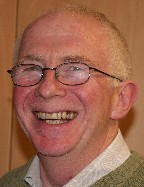 John Fearon has worked for BT for 34 years and is a storyteller with the Flying Donkeys storytelling troupe in Derby. He’s one of the 100 BT Storytellers selected to tell their Olympic stories – more about the scheme at https://www.btlondon2012.co.uk/storytellers/index.php
John Fearon has worked for BT for 34 years and is a storyteller with the Flying Donkeys storytelling troupe in Derby. He’s one of the 100 BT Storytellers selected to tell their Olympic stories – more about the scheme at https://www.btlondon2012.co.uk/storytellers/index.php
– Why did you decide to apply to be a BT Storyteller and what does taking part mean for you?
I have worked for BT for thirty-four years now, and I have been a Storyteller, telling tales of daring do, like George and the Dragon, or the tale of the Lambton Worm, for twelve years. So when I read the article inBT Today asking if anyone would like to be an Olympic Storyteller I just had to give it a punt.
– What did it feel like when you knew you’d been selected?
Chuffed!
– Which modern technologies – television, radio and the internet – do you use?
I use all of the above technologies, but with different degrees of success. For instance; this is about my fifth go at writing this email! My favourite without doubt is radio; with the BBC’s Radio 4 coming in as my number one.
– What do you think a big social event like the Olympics & Paralympics means for community and for isolated people within a country?
I hope and believe that both the Olympic Games and the Paralympics will unite the country. Much in the way that an international game of soccer or cricket would, but even more so. That said, I do know people who take the opinion of, “Well, London 2012 – that’s for London, nothing to do with me.” I hope they will be persuaded to change their minds on that.
– What’s your favourite story from the Games so far?
My favourite story from the Games so far is Dedication by Patrick Simkins. I just admire Oscar Pistorius so much, and I feel he is an inspiration to all disabled people.
– Do you think coverage of the Olympics and Paralympics is an important factor in the portrayal of disabled people?
As a “Disabled” person myself I am looking forward to the coverage of the Paralympics, as I would not have the guts to attempt what some of these boys and girls are doing.
– What does London 2012 mean for you overall?
London 2012 is a great opportunity for the UK to showcase to the world what a diverse and multi-cultural, tolerant place it can be. Let us hope that that opportunity is not lost for us, by one of the minority of folks with an axe to grind exploding a bomb in Trafalgar Square or suchlike, which seems to be happening with more and more regularity.
– What do you think people will be feeling as they watch or listen to Olympic coverage?
I hope people will be feeling pride at the huge amount of medals we win! I would also like to think pride, in the way we play the game, if we do not win any medals.
– What do you think of modern technology – television, radio and the internet – as a way of avoiding isolation among vulnerable people?
I am a great fan of modern technology. We have the opportunity to reach people with the 2012 Olympics that have never been reached before.
– What should be the 21st century’s key message on disability/community?
I hope that the message that goes out from the 2012 games is that you do not have to be a Daley Thompson or a Mary Rand to take part in sport. Every one of us can join in and do something.
For more information about John, take a look at the Flying Donkeys storytellers’ site www.flyingdonkeys.co.uk!

